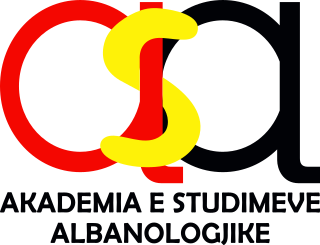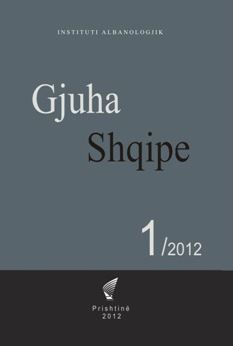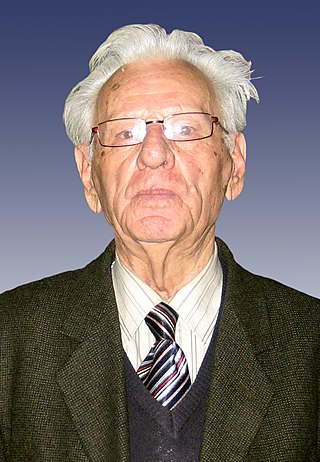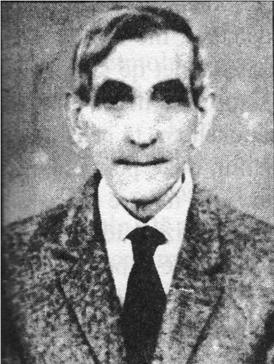
Eqrem Çabej was an Albanian historical linguist and scholar who, through the publication of numerous studies gained a reputation as a key expert in research on Albanian language, literature, ethnology and linguistics.
Jakup Veseli was a leading figure in the Albanian independence movement one of the delegates of Albanian Declaration of Independence, representing the region of Chameria.

The Muzaka family was an noble Albanian family that ruled over the region of Myzeqe in the Late Middle Ages. The Muzaka are also referred to by some authors as a tribe or a clan. The earliest historical document that mentions the Muzaka family is written by the Byzantine historian Anna Komnene. At the end of the 13th and beginning of the 14th century members of the Muzaka family controlled a region between the rivers of Devoll and Vjosë. Some of them were loyal to the Byzantine Empire while some of them allied with Charles of Anjou who gave them impressive Byzantine-like titles in order to subdue them more easily. In the 1340s, Stefan Dušan pressed further south into Albania, and by 1343-45 had taken central towns and territories in southern Albania, including domains of the Muzaka family. However, they would fall back under local control after his death in 1355. After the Battle of Savra in 1385 the territory of Albania came under the Ottoman Empire; they served the Ottomans until 1444 when Theodor Corona Musachi joined Skanderbeg's rebellion. When the Ottomans suppressed Skanderbeg's rebellion and captured the territory of Venetian Albania in the 15th century many members of the Muzaka family retreated to Italy. Those who stayed in Ottoman Albania lost their feudal rights, some converted to Islam and achieved high ranks in the Ottoman military and administrative hierarchy.

The Academy of Sciences of Albania, founded in 1972, is the most important scientific institution in Albania. In the 1980s, several research institutes began at the University of Tirana were transferred to the Academy's jurisdiction. The institution includes the most distinguished scientists, also called "academics", that are involved in research centers and other organisations inside and outside Albania. As of 2009, the Academy had 23 regular members, 10 associated members, one permanent member, and 26 honor members.
Opinga are traditional shoes worn by Albanians in Albania, Kosovo, North Macedonia (opinci), Montenegro, Greece, and the Arbëresh villages of Italy. They were also worn by countrymen in Romania (opinca), Serbia, Croatia, Bosnia and Herzegovina (opanak), Bulgaria (opinka), and other countries. They are made of a single leather skin, formed to the feet with leather or wool strips. A southern Albanian variety of opinga are the typical turned up leather shoes with red and black wool pompoms on the ends, which are often used for folk dances.

Mahir Domi (1915–2000) was an Albanian linguist, professor, and academic. He was one of the organizers and main participants of the Albanian Orthography Congress, and member of the follow-up commission responsible for deploying the orthographic rules of the Standard Albanian language.

Aqif Pasha Biçaku mostly known as Aqif Pashë Elbasani was an Ottoman Albanian political figure in the Sanjak of Elbasan and after the Young Turk Revolution became an activist for the Albanian national cause.

The Academy of Albanological Studies (AAS) is the main institution of albanology in Albania.
Zenel Bastari or Zenel Hyka was an Albanian poet of the Bejtexhinj literary movement. A native of Tirana, he lived and worked from the end of 18th century until mid 19th century. Together with Hasan Zyko Kamberi and Nezim Frakulla he was part of the Bejtexhinj who focused on social and political criticism rather than Islamic moral and life. A precursor of the bourgeois critical-realism, he is also considered one of the first anti-feudal writers in Albania.

Studime Filologjike is a scientific magazine on Albanian language and literature, published by the Centre of Albanological Studies. It publishes linguistics studies, literary historical studies, old texts, resumes of scientific work on literature criticism and linguistics, etc.

Gjuha Jonë is a magazine published in Tirana, Albania, focusing on the standard and literary Albanian language. It is published by the Centre of Albanological Studies. Its main functions consist of enlarging the functionality of the standard Albanian language and elevation of its social prestige, the educational system and staff, strategies on augmentation of press organs and publishing media, and increase of the researchers in the linguistics field.

Kultura Popullore is a quarterly magazine published in Tirana, Albania by the Centre of Albanological Studies. It publishes scientific articles on different fields of Albanian ethnography and folklore.

Albanological Institute of Pristina is the main Institute of Albanology in Pristina, Kosovo. It is an independent public institution. Together with the Centre of Albanological Studies in Tirana, they represent the core scientific research centers on Albanology.

Gjuha Shqipe is a scientific magazine published by the Albanological Institute. It focuses on topics related to the Albanian language, its purification, spread, and development, and possible changes on its standard form.

Idriz Ajeti was an Albanologist from Kosovo and one of the main researchers and authorities on the Albanian language studies of post World War II. He was involved for a long period in the academic life of the University of Pristina, and was a member of the Academy of Sciences and Arts of Kosovo, being its chairman for seven years.
Marenglen Verli is an Albanian historian and scholar. Since 2009, he is a member of the Academy of Sciences of Albania.

Tahir Nasuf Dizdari was an Albanian orientalist, folklorist, and scholar. He was the main orientalist in Albania, and contributed in identifying and studying oriental words borrowed from Albanian.

Injac Zamputi was an Albanian scholar, writer, and historian.
The Convention of Kuçi was an interregional assembly held on July 14–15, 1614, in the area of the Kuçi tribe in the region of Malësia in modern northernmost Albania and Montenegro. A second assembly was held on September 8, 1614, which reaffirmed the decisions of the July assembly and also had an enlarged participation. Of the 44 representatives of the first assembly, almost all were from the Albanian tribes and the tribes of Montenegro. Several representatives of tribes are mentioned in the reports of the decisions of the assembly like Gjergj Bardhi from Mirdita and Gjin Gjergji from Dukagjin.

The Battle of Mashkullorë took place between Albanian rebel forces under the command of Çerçiz Topulli and the Ottomans.















